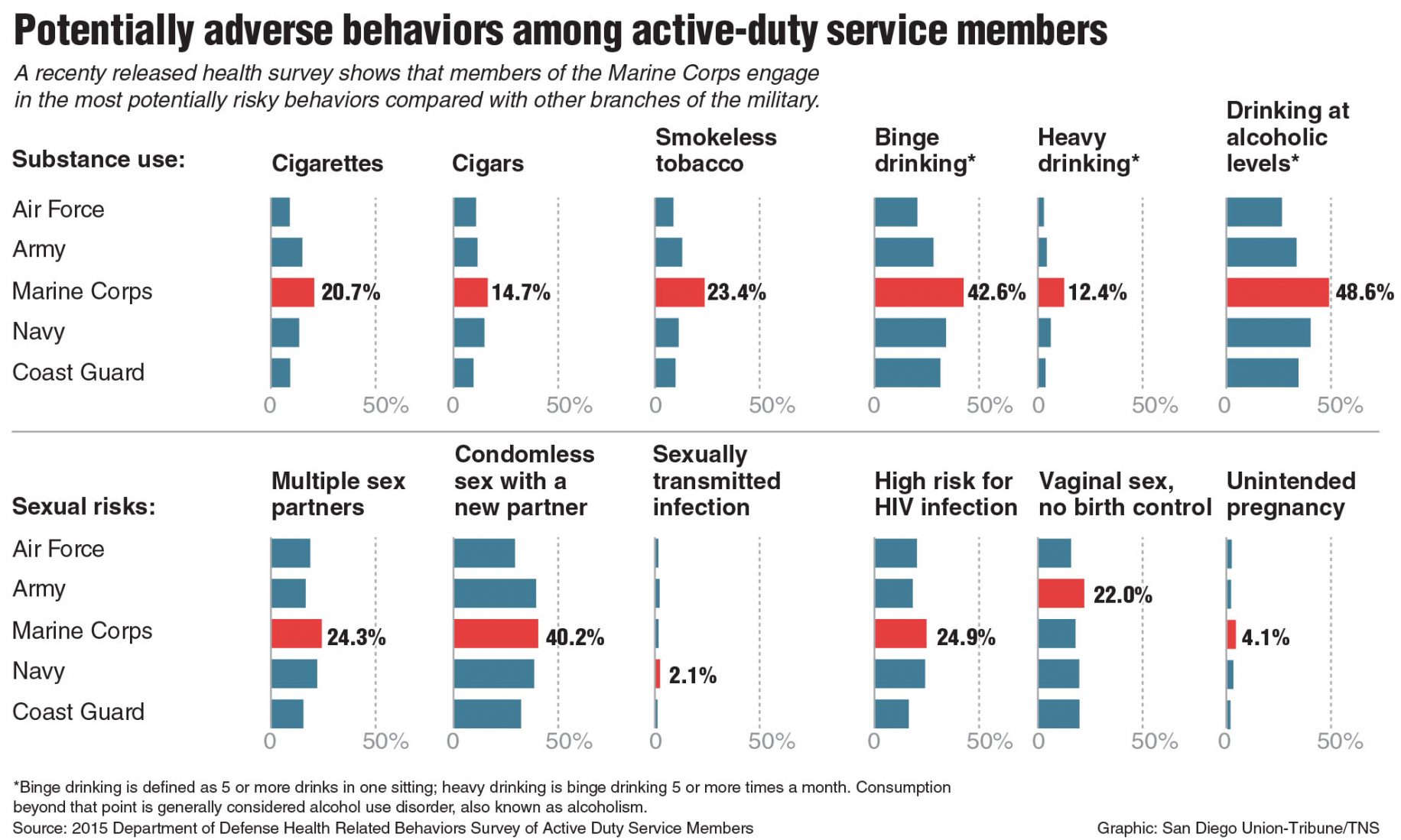A new report from the RAND Corp. analyzed survey data from thousands of active-duty military members and found Marines are more likely to be heavy drinkers, use tobacco and engage in riskier sexual behavior than the sailors, soldiers and airmen of the other branches.
RAND found that incidents of binge drinking and hazardous drinking among Marines were almost double what they were in the Air Force.

Chart of substance abuse problems among active duty service members. (San Diego Union-Tribune 2018/TNS)
The report defines binge drinking as having at least four or five drinks on one occasion. Hazardous drinking is defined as usage that suggests alcohol use disorder, commonly known as alcoholism.
Nearly half of the Marines surveyed reported drinking habits that met the criteria for hazardous.
The survey also revealed Marines were more likely to have had more than one sex partner of the course of one year and were less likely to use condoms with new partners.
The data were gathered as part of the 2015 Health Related Behaviors Survey conducted across all branches of the military and the Coast Guard.
Researchers spent two years combing through and making sense of the data, which included responses to numerous aspects of physical and mental health.
In addition to questions about drug and alcohol use, respondents provided researchers with information on their eating and sleeping habits, sexual behavior as well as their diets and exercise.
Almost 17,000 usable surveys were involved in the study.
Dr. Sarah Meadows, a senior sociologist at RAND who helped lead the study, said although it is useful in making policy decisions at the Department of Defense, people should be careful when drawing conclusions or casting judgment on one branch or another.
“We’re not trying to blame anyone for this, but the Marine Corps does tend to stand out,” she said. “Each of the services has their own culture.”
Meadows said one of the reasons the Marines stand out is simple demographics.
“Marines tend to be young men,” she said. “Compared to young men on college campuses, it’s pretty similar.”
Meadows partially explained the discrepancy as self-selecting based on who chooses to join the military and which branches they choose.
In other words, the type of person who joins the Marines is not necessarily the type of person who joins the Air Force.
The Navy came in second in alcohol use, followed by the Coast Guard and the Army.
Researchers also separated the data based on other factors, such as gender, race, age and rank. Results show that alcohol use is an issue across the services.
One in three said they had participated in binge-drinking in the past month. Almost 70 percent said they perceived military culture as supportive of drinking.
Overall, results show tobacco use down in the military, and lower than in the general population.
Marines led in tobacco use as well. Marines were significantly more likely to smoke cigarettes, cigars and e-cigarettes. They are also almost twice as likely as members in other branches to use smokeless tobacco, or “dip.”
Noting the tobacco numbers overall showed a downward trend, Meadows said the results were encouraging. However, she did note that e-cigarette use was on the rise, and that was cause for concern.
“We don’t know the long-term consequences,” she said.
None of this information is new to the military. Programs have existed for years aimed at curbing smoking and drinking.
1st Lt. David Morris works in communications at 1st Marine Expeditionary Force at Camp Pendleton. He said reports such as this one from RAND were useful in targeting areas of improvement for the Marines.
“Marines are always about constantly improving,” he said. “If we can improve, it’s something we’ll explore.”
Morris said that it’s too soon to see any new programs emerge from the RAND study, but that there were existing programs in place on Camp Pendleton, such as the Substance Abuse Counseling Center.
“We do have programs when we identify high-risk Marines,” he said.
He also said there were posters all around base discouraging vaping and that there were many places Marines could not use smokeless tobacco anymore.
Lisa Novak, a public affairs officer for the Coast Guard, said the service makes a concerted effort to educate its members about alcohol abuse and prevention.
“The Coast Guard provides consistent messaging about the services and support available to personnel,” she said in an email.
Novak also said any member of the military can access the Pentagon’s tobacco cessation programs for free via www.ucanquit2.org.
Meadows said the results would be useful to congress and the Defense Department in deciding where to devote resources. She suggested the department decide on certain benchmarks for the military, such as how much alcohol and tobacco use is acceptable.
“Obviously, the perfect answer is ‘zero,’” she said, adding that that was an unrealistic goal. “(But) what is the right number for some of these things?”
———
© 2018 The San Diego Union-Tribune
Distributed by Tribune Content Agency, LLC.



